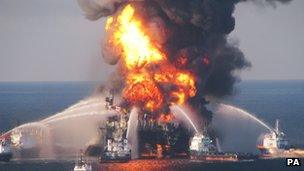New insurance rules for North Sea oil firms
- Published

The new guidelines were prompted by the Deepwater Horizon Disaster in 2010
New guidelines on covering the cost of oil spills in the North Sea have come into effect.
The move means firms will have to demonstrate "financial responsibility" for drilling operations before a licence is granted.
It follows a review held in the wake of the Deepwater Horizon disaster in the Gulf of Mexico.
But environmental group WWF Scotland said the guidelines would do little to prevent oil spills.
It also claimed the guidelines would make no difference to wildlife caught up in any future incident.
The UK Department of Energy and Climate Change ordered a review of regulations in light of the Deepwater Horizon oil spill in 2010.
The resulting Maitland Review, external was published in December 2011.
In announcing the government response to the review last month,, external UK Energy Minister John Hayes said it was "vital" that oil and gas activities met "the highest possible standards of safety and environmental protection".
Under the new guidance, UK offshore oil and gas firms will need to show they are able to pay for an incident which occurs during a specific operation.
The guidelines suggest existing insurance cover remains broadly appropriate for many operators, but call for increased levels of cover from explorers in more difficult waters, where the cost of a spill could be greater.
Lang Banks, of WWF Scotland, said: "While it's only right that oil and gas explorers should be forced to be insured to levels high enough to cover the costs of capping and clean-up, these new rules will do little to prevent future spills.
"Total's Elgin and Shell's Gannet Alpha platforms were all insured but it still didn't prevent accidents at those facilities.
"Any level of insurance cover is meaningless to the thousands of marine birds, mammals and other wildlife that would be wiped out by a single deepwater oil spill."
He added: "The only way to prevent future spills and accidents is to end our addiction to oil, stop giving tax breaks to the oil industry and stop exploration for new oil and gas in dangerous deepwater locations."
- Published20 September 2012
- Published11 July 2012
- Published9 November 2012